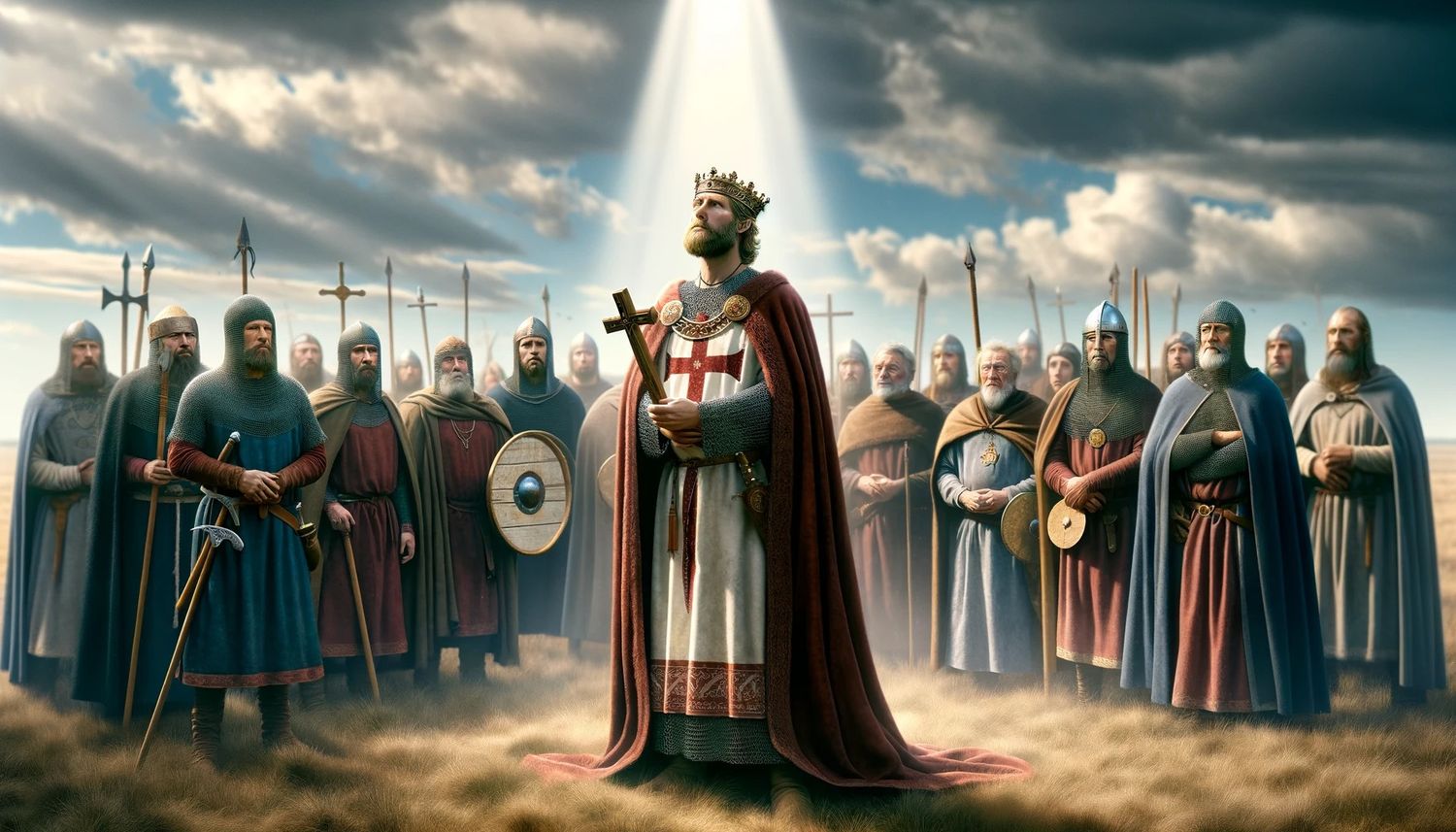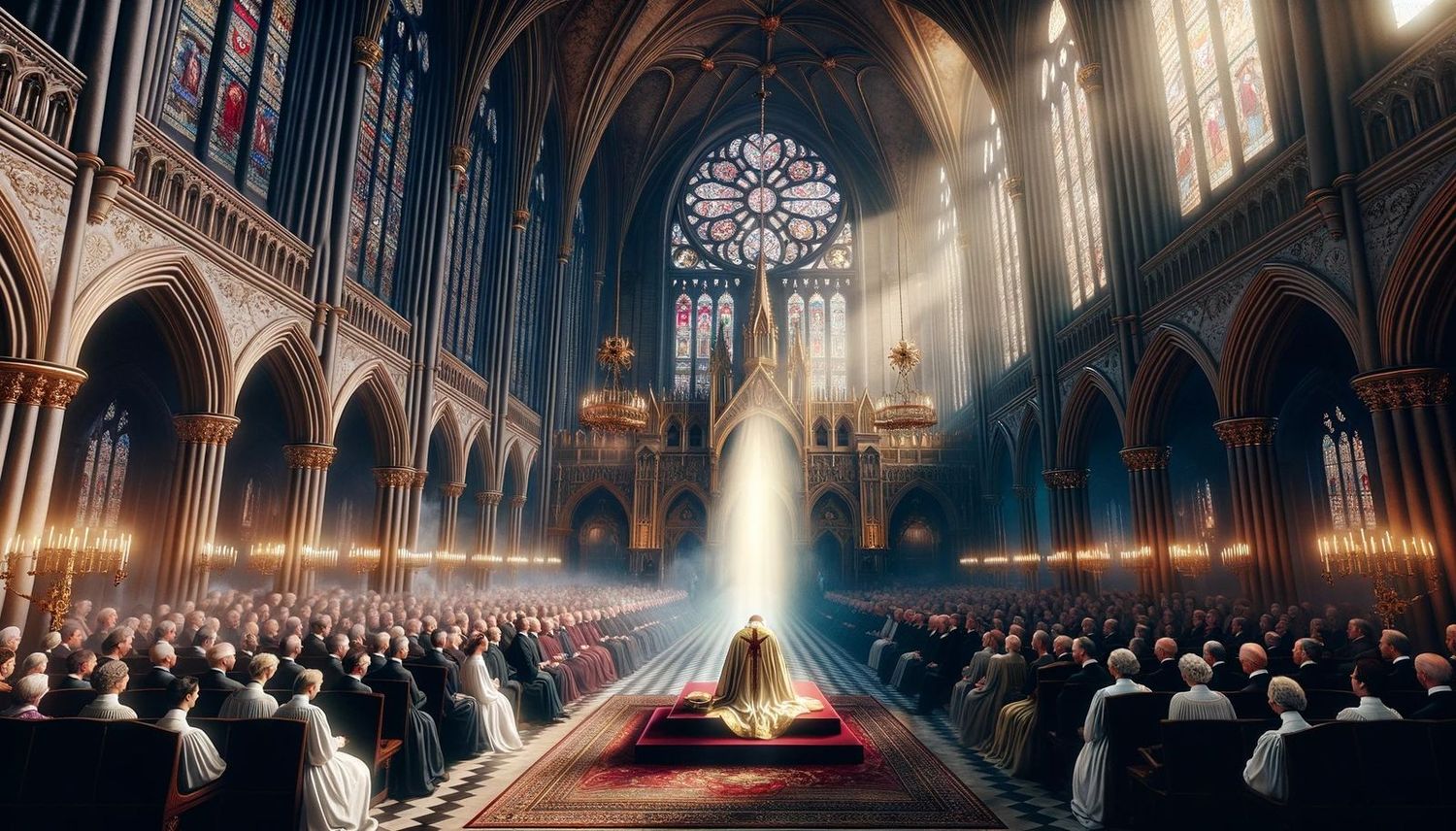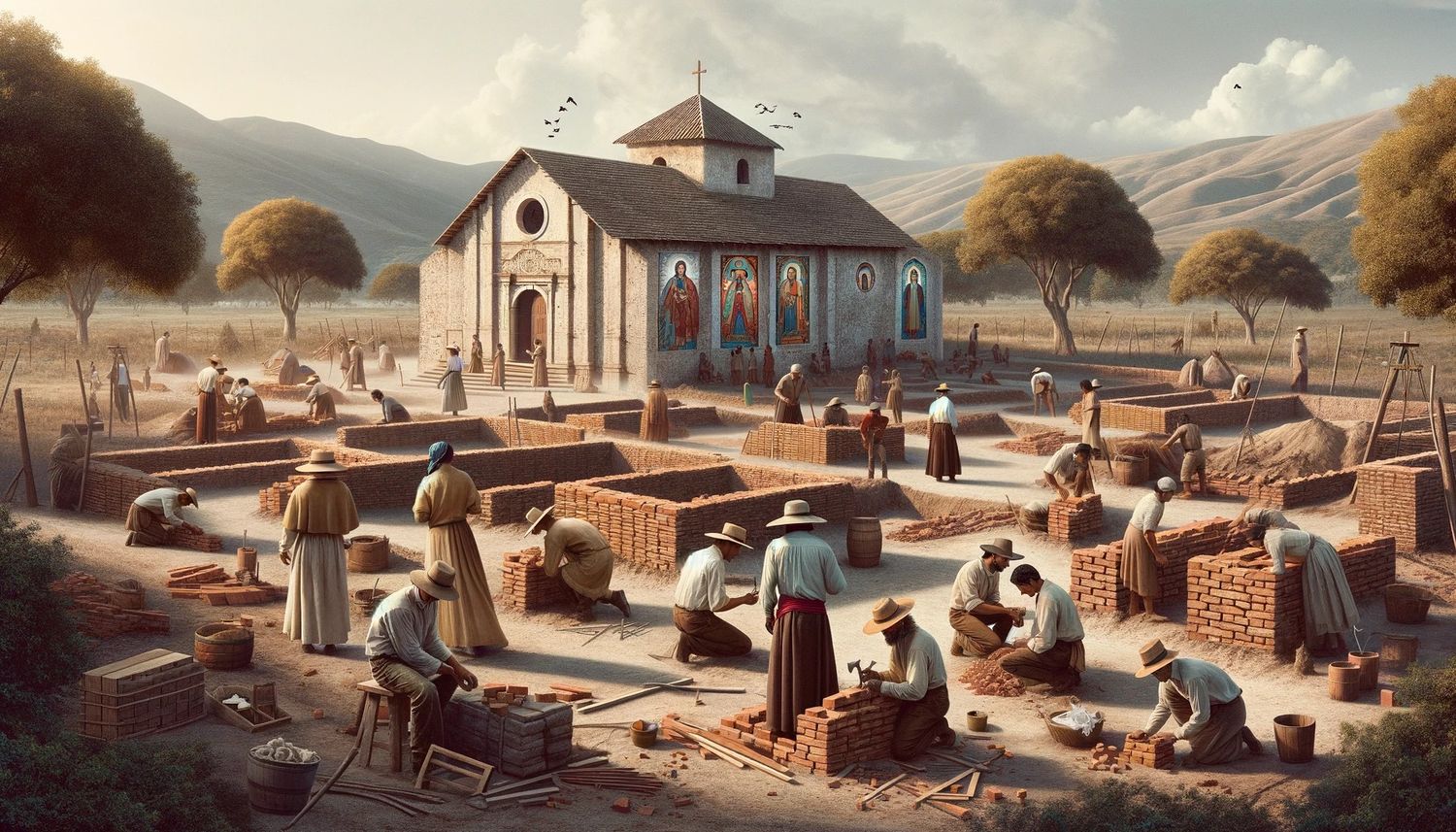Home>Theology and Spirituality>Who Was The First Germanic King To Convert To What Is Now Known As Catholicism


Theology and Spirituality
Who Was The First Germanic King To Convert To What Is Now Known As Catholicism
Published: February 18, 2024
Ericka Andersen, an editor at Christian.net, expertly merges digital strategy with content creation, focusing on faith and societal issues. Her communication skills enhance the platform's engaging narratives, fostering meaningful dialogue on belief's impact on society.
Discover the first Germanic king to convert to Catholicism and the impact on theology and spirituality. Explore the historical significance of this pivotal religious transformation.
(Many of the links in this article redirect to a specific reviewed product. Your purchase of these products through affiliate links helps to generate commission for Christian.net, at no extra cost. Learn more)
Table of Contents
Introduction
The conversion of King Clovis I to what is now known as Catholicism marked a pivotal moment in the history of the Germanic peoples and the spread of Christianity in Western Europe. This significant event not only transformed the religious landscape of the region but also had far-reaching implications for the political and cultural development of the Frankish Kingdom.
The story of King Clovis I's conversion is a compelling narrative that sheds light on the intersection of faith, power, and historical change. It offers a fascinating glimpse into the religious beliefs and practices of the early Germanic tribes and the profound impact of Christianity on their society.
As we delve into the details of King Clovis I's conversion, we will uncover the rich tapestry of religious traditions that characterized the early Germanic peoples. We will explore the spiritual worldview of these tribes, their reverence for deities such as Odin and Thor, and the intricate rituals that formed the cornerstone of their religious practices.
Furthermore, we will unravel the transformative journey of King Clovis I as he embraced the tenets of Catholicism, examining the motivations behind his decision and the broader implications for the Frankish Kingdom. By delving into the historical context and the dynamics of power and influence, we will gain a deeper understanding of the factors that precipitated this momentous conversion.
The conversion of King Clovis I stands as a testament to the enduring impact of religious change on the course of history. It serves as a compelling example of how faith can shape the destiny of nations and leave an indelible imprint on the cultural and political landscape. As we embark on this exploration, we will unravel the intricate threads of this captivating narrative, illuminating the profound significance of King Clovis I's embrace of Catholicism.
Read more: Why Did King Henry IV Convert To Catholicism
Early Germanic Religion
The early Germanic peoples, comprising tribes such as the Franks, Goths, Vandals, and Saxons, held a rich tapestry of spiritual beliefs that permeated every aspect of their lives. At the core of their religious worldview was a deep reverence for a pantheon of deities, each associated with various aspects of nature, warfare, and fertility. Among these gods, Odin, the Allfather and god of wisdom, war, and poetry, held a position of paramount importance. The thunder god Thor, known for his mighty hammer Mjölnir, was revered for his protective and fertility-related attributes. These deities were not distant figures but were intimately woven into the fabric of daily existence, with rituals and offerings aimed at appeasing and seeking favor from the divine realm.
The Germanic tribes also held a profound connection to the natural world, viewing it as imbued with spiritual significance. Sacred groves, natural springs, and ancient trees were revered as sacred sites where the divine and mortal realms intersected. These locations served as focal points for religious ceremonies, communal gatherings, and rites of passage, underscoring the intimate relationship between the people and the land they inhabited.
Moreover, the Germanic religious practices were characterized by a strong oral tradition, with myths, legends, and heroic sagas forming the bedrock of their cultural identity. These narratives not only provided moral guidance and a sense of communal belonging but also offered insights into the cosmic order and the intricate interplay between gods, mortals, and supernatural beings.
The religious landscape of the early Germanic tribes was not static but dynamic, evolving in response to migrations, interactions with neighboring cultures, and the ebb and flow of tribal alliances. As they encountered the Roman Empire and other advanced civilizations, their religious beliefs underwent transformations, incorporating new elements while retaining core aspects of their indigenous spirituality.
In essence, the early Germanic religion was a vibrant tapestry of myth, ritual, and communal tradition, shaping the worldview and cultural identity of the Germanic peoples. This rich spiritual heritage laid the groundwork for the momentous transition that would unfold with the conversion of King Clovis I to Catholicism, ushering in a new chapter in the history of the Frankish Kingdom and the broader European continent.
The Conversion of King Clovis I
King Clovis I, the founder of the Merovingian dynasty and the first king of the Franks to unite all the Frankish tribes under one ruler, played a pivotal role in the spread of Christianity among the Germanic peoples. The story of his conversion to Catholicism is a compelling saga of political acumen, strategic alliances, and religious transformation.
In the year 496, during a decisive battle against the Alamanni, Clovis I found himself in a perilous situation. As the tides of the conflict turned against him, he invoked the Christian God, promising to convert to the faith if victory was granted to him. Miraculously, the tide of battle shifted in his favor, leading to a resounding triumph. True to his word, Clovis I embraced Christianity, marking a profound turning point in the religious landscape of the Frankish Kingdom.
The circumstances surrounding Clovis I's conversion are emblematic of the intricate interplay between faith and power in the medieval world. His strategic adoption of Christianity not only solidified his ties with the Roman Church but also garnered support from the growing Christian population within his realm. By aligning himself with the Church, Clovis I positioned himself as a champion of the Christian faith, endearing himself to both the ecclesiastical authorities and the burgeoning Christian populace.
Furthermore, Clovis I's conversion served as a catalyst for the Christianization of the Frankish Kingdom, paving the way for the gradual displacement of indigenous Germanic religious practices. His embrace of Catholicism set a powerful precedent, influencing the religious orientation of his successors and laying the groundwork for the establishment of a Christian monarchy in the Frankish realm.
The conversion of King Clovis I was not merely a personal spiritual decision but a shrewd political maneuver that reverberated across the annals of history. It marked the fusion of religious and political authority, shaping the destiny of the Frankish Kingdom and leaving an indelible imprint on the course of Western European civilization. Clovis I's conversion stands as a testament to the enduring impact of faith on the affairs of state, illustrating the profound influence of religious transformation on the trajectory of nations.
In essence, the conversion of King Clovis I to Catholicism stands as a watershed moment in the history of the Frankish Kingdom and the broader narrative of Christian expansion in Western Europe. It embodies the intricate nexus of faith, power, and historical change, underscoring the transformative potency of religious conversion in shaping the contours of medieval society.
Impact of Clovis I's Conversion
Clovis I's conversion to Catholicism reverberated across the Frankish Kingdom and beyond, leaving an indelible imprint on the religious, political, and cultural landscape of Western Europe. The ramifications of this momentous event were far-reaching, shaping the destiny of the Frankish monarchy and heralding a new era of Christian dominance in the region.
First and foremost, Clovis I's embrace of Catholicism solidified his position as a pivotal figure in the Christianization of the Frankish Kingdom. His conversion served as a catalyst for the widespread adoption of Christianity among the Frankish nobility and the broader populace, leading to the gradual displacement of indigenous Germanic religious practices. This transformative shift laid the groundwork for the establishment of a Christian monarchy, with the Church wielding significant influence over matters of governance and societal norms.
Furthermore, Clovis I's conversion strategically positioned the Frankish Kingdom within the broader framework of Christian Europe. By aligning himself with the Roman Church, Clovis I forged alliances with influential ecclesiastical authorities, garnering support from the growing Christian population within his realm. This not only bolstered his political legitimacy but also facilitated diplomatic ties with other Christian rulers, cementing the Frankish Kingdom's place within the burgeoning network of Christian polities.
Moreover, the conversion of Clovis I had profound implications for the religious and cultural identity of the Frankish Kingdom. The integration of Catholicism as the dominant faith engendered a sense of unity and cohesion among the diverse Frankish tribes, fostering a shared religious framework that transcended tribal affiliations. This religious unification laid the groundwork for the consolidation of a distinct Frankish identity, distinct from the broader Germanic tribal affiliations, and contributed to the emergence of a cohesive Frankish society.
Additionally, Clovis I's conversion set a precedent for the fusion of religious and political authority, shaping the trajectory of the Frankish monarchy for generations to come. The intertwining of the Church and the monarchy imbued the Frankish rulers with a divine mandate, elevating their status as Christian sovereigns and imbuing their reigns with religious significance. This fusion of temporal and spiritual authority laid the groundwork for the concept of "divine right" that would characterize the medieval European monarchies in the centuries to come.
In essence, the conversion of Clovis I to Catholicism ushered in a new epoch in the history of the Frankish Kingdom, marking the ascendancy of Christianity as the dominant religious and cultural force. The enduring impact of his conversion reverberated through the annals of history, shaping the destiny of the Frankish monarchy and contributing to the broader narrative of Christian expansion in Western Europe.
Conclusion
The conversion of King Clovis I to what is now known as Catholicism stands as a watershed moment in the history of the Frankish Kingdom and the broader narrative of Christian expansion in Western Europe. This transformative event, marked by the strategic alignment of faith and power, reverberated across the religious, political, and cultural landscape, leaving an indelible imprint on the destiny of the Frankish monarchy and the broader course of Western European civilization.
Clovis I's embrace of Catholicism not only signaled a profound shift in the religious orientation of the Frankish Kingdom but also laid the groundwork for the consolidation of a Christian monarchy, where the fusion of temporal and spiritual authority would shape the trajectory of the Frankish rulers for generations to come. His conversion served as a catalyst for the widespread adoption of Christianity among the Frankish nobility and the broader populace, leading to the gradual displacement of indigenous Germanic religious practices and the establishment of a cohesive Frankish Christian identity.
Furthermore, Clovis I's strategic alignment with the Roman Church positioned the Frankish Kingdom within the broader framework of Christian Europe, forging diplomatic ties with other Christian rulers and solidifying the Frankish Kingdom's place within the burgeoning network of Christian polities. This not only bolstered the political legitimacy of the Frankish monarchy but also facilitated the integration of the Frankish Kingdom into the broader tapestry of Christian civilization.
Moreover, the conversion of Clovis I had profound implications for the religious and cultural identity of the Frankish Kingdom, fostering a sense of unity and cohesion among the diverse Frankish tribes and contributing to the emergence of a distinct Frankish Christian society. The fusion of religious and political authority imbued the Frankish rulers with a divine mandate, elevating their status as Christian sovereigns and imbuing their reigns with religious significance, laying the groundwork for the concept of "divine right" that would characterize the medieval European monarchies in the centuries to come.
In essence, the conversion of King Clovis I to Catholicism stands as a testament to the enduring impact of faith on the affairs of state, illustrating the profound influence of religious transformation on the trajectory of nations. This pivotal moment in the history of the Frankish Kingdom serves as a compelling example of how the intersection of faith, power, and historical change can shape the destiny of nations and leave an indelible imprint on the cultural and political landscape. Clovis I's embrace of Catholicism not only transformed the religious landscape of the Frankish Kingdom but also set in motion a series of events that would resonate through the annals of history, shaping the destiny of Western Europe and the enduring legacy of Christian civilization.















